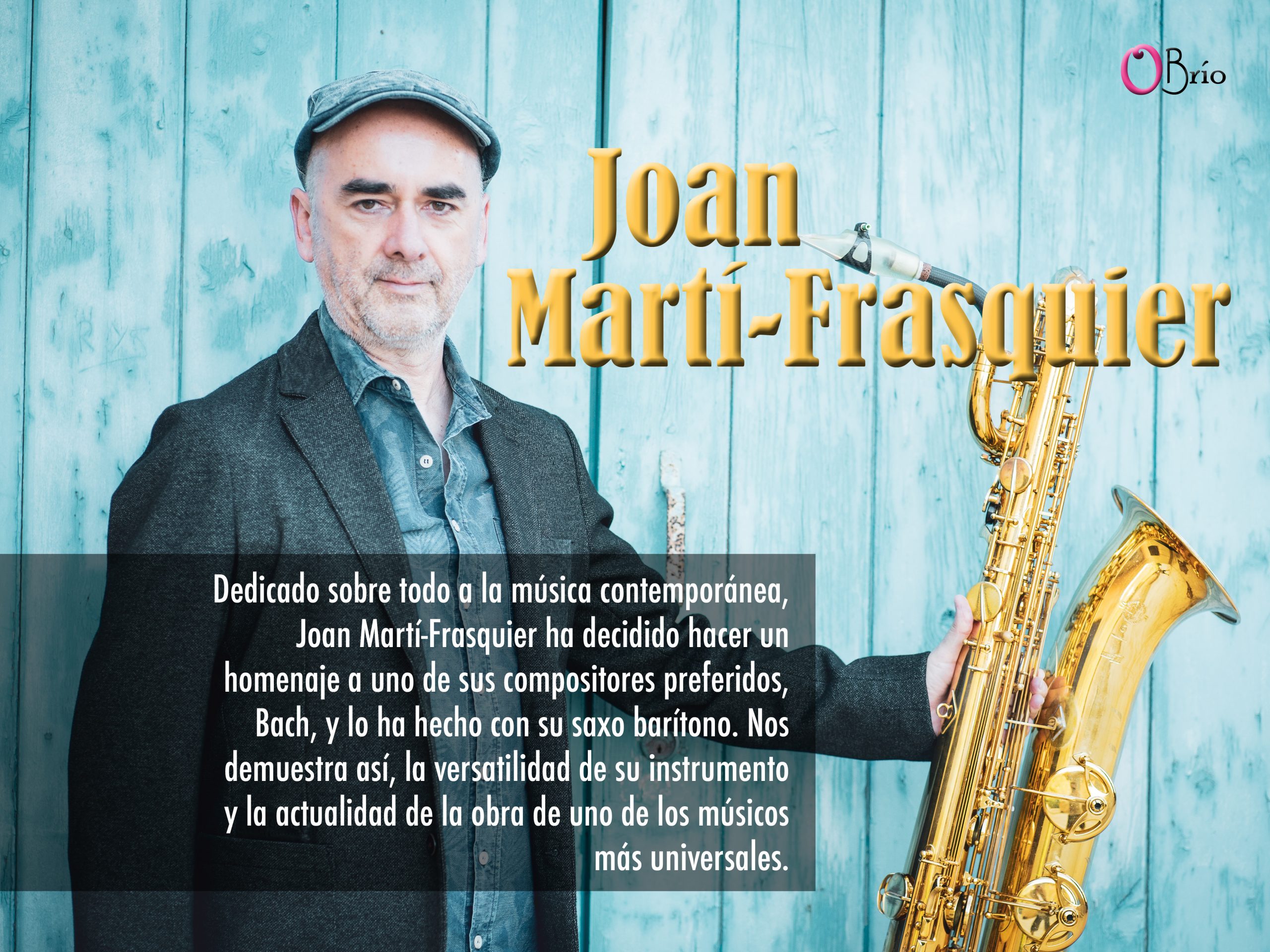



Brío Clásica: Teniendo en cuenta que cuando Bach realizaba sus composiciones no existía el saxo, ¿cómo ha sido la adaptación de las Suites a este instrumento? ¿ha tenido que realizar algún trabajo de reescritura?
Joan Martí-Frasquier: Pienso que la música de Johann-Sebastian Bach es tan universal que está por encima de épocas e instrumentos. Yo siempre he tocado estas Suites con la partitura original para violoncelo sin cambiar nada, a excepción de alguna articulación que iba mejor para el saxofón barítono. Lo único que no toco tal como está escrito es la polifonía (por razones organológicas obvias, aunque con mi instrumento se pueden tocar dobles octavas), omitiendo entonces las dobles cuerdas y tocando los acordes en arpeggiatto.
B.C: Usted es un músico polifacético en cuanto a género se refiere, pero principalmente se interesa por la música electroacústica contemporánea, ¿Qué le aporta la música de Bach, más libertad o más disciplina?
J.M.F: Para mi, toda la música, independientemente del compositor y de la época, conlleva ambos aspectos: disciplina y rigor en el trabajo para que el resultado sea inteligible, y libertad dentro el estilo para que la interpretación sea lo más orgánica posible. En este caso, el estudio profundo de las suites ha exigido una aproximación a mi instrumento en aspectos técnicos e interpretativos muy diferente a la de mi repertorio habitual.
B.C: Siempre he pensado que para la música contemporánea hay que tener un oído aventurero y estoy segura de que el público que asiste a sus recitales lo tiene, ¿cómo reaccionan ante su interpretación de las suites de Bach?
J.M.F: Tener “oído aventurero” y también una mente abierta, pero no sólo con la música contemporánea. Ir a un concierto y no hacer una escucha activa no sirve de nada. Cuando toco Bach en concierto siempre lo combino con música original de nuestro tiempo para saxofón barítono. Yo pienso que el público se sorprende gratamente al escuchar un repertorio tan diferente tocado con un instrumento tan versátil. El hecho de encontrar más afinidades que diferencias entre el violoncelo y el saxofón barítono, quizás es lo que hace que el público siempre responda tan bien.
B-C: ¿Cómo se siente más cómodo en el escenario, usted solo con su instrumento o acompañado de orquesta?
J.M.F: Siempre me siento bien en un escenario, ya sea tocando solo, como solista o formando parte de una agrupación camerística u orquestal. Quizás tocando solo, uno siente más la libertad y el compromiso de estar transmitiendo sus ideas y moldeando los sonidos. Tocar en conjunto añade esa complicidad y esa energía compartida que se produce cuando se forma parte de un colectivo.
B.C: ¿Piensa adentrarse a partir de ahora en interpretar más obras de compositores clásicos como Bach? ¿algún otro en mente?
J.M.F: El proyecto de llevar a Johann-Sebastian Bach (uno de mis compositores admirados) al escenario y grabarlo más tarde, ha sido más bien una necesidad personal y sobretodo un reto artístico que se han dado en un momento concreto, coincidiendo con los 300 años de la composición de sus Suites para violoncelo solo. En estos momentos no sabría decirte si habrá algún otro “clásico” más en el futuro ya que tengo otras ideas y planes con música de nuestros días.
B.C: Seguro que quiere llegar al mayor número de aficionados a la música posible con este nuevo trabajo, ¿a quién cree que puede sorprender más, al público que mejor conoce su trabajo, más aficionado a la música contemporánea, o a un enamorado de Bach?
J.M.F: A mi me gustaría llegar y sorprender (gratamente, claro) a un público lo más amplio posible para que aceptara por igual ambos estilos de música (en definitiva, los estilos y las épocas tienen unas características que deberían servirnos para clasificar la música, no para “etiquetarla”). También para que se reconociera un instrumento que no goza de la misma asiduidad en los escenarios que tienen otros, muchas veces por motivos extra-musicales. Pero sobretodo para que los promotores de conciertos actualicen y normalicen sus programaciones atendiendo a la mayor diversificación de artistas y propuestas de nuestros días: ¿cómo va a venir público nuevo a los conciertos si siempre se toca lo mismo?
B.C: El disco sorprende por original, nunca había escuchado a Bach al saxo y suena muy bien. Además de la novedad, ¿qué puede aportar esta versión a un aficionado a la música clásica?
J.M.F: Muchas gracias por su comentario. La verdad es que no me he planteado qué puede aportar esta versión. Podría responder con un tópico como “esta grabación la hice con la intención de proponer una escucha diferente a lo que el público espera de un instrumento de viento más asociado a la música contemporánea o al jazz, y con un timbre muy diferente al de los instrumentos históricos”, pero dejaré que sea el/la oyente quien lo decida.
B.C: Háblenos de sus próximos conciertos y si podremos verle en Madrid.
J.M.F: El sábado 27 de mayo estaré en el festival internacional “I Concerti del Principe” de Loano (Italia) tocando Bach junto a música original para saxofón barítono y piano de Albena Petrovic con la misma compositora. En junio tengo otros conciertos con otro repertorio y a mediados de julio presentaré SUITES en la Academia Mestral, un curso de verano que organiza el cuarteto de saxofones Kebyart en Altafulla (Tarragona). En estos momentos estoy concretando fechas para presentar este homenaje a Bach la próxima temporada. Me encantaría ir a Madrid a tocar Bach. Precisamente, en mayo de 2022 presentamos allí el disco “Dreamlover” de Albena Petrovic, también grabado para el sello alemán Solo Musica, y guardo un muy buen recuerdo de la ciudad.
